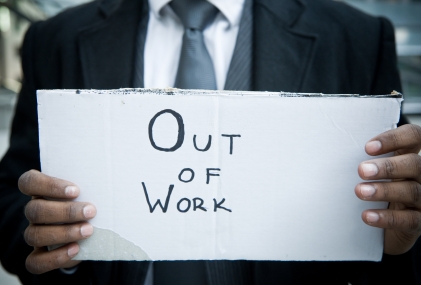We are all familiar with the various classes of people provided for by both the Federal and State fair employment practices acts. These include the traditional race, gender, age, disability and many more too numerous to be listed here. Well, hold on to your hats as there seems to be a new one being added. It now seems that the unemployed are being added to the list.
The unemployment rate seems to be on the decline, i.e. around 8.3% still without jobs. However, this is still 3% higher than when the financial "fit hit the shan" almost 4 years ago. Obviously, when the ranks of the unemployed are high, employers who are looking to hire are inundated with candidates. So much so that some employers are now disqualifying qualified applicants by advertising that "the unemployed" need not apply.
In light of this phenomena in job advertisements, Congress in their usual, under-informed method of operating, as well as several states, have begun the process of amending their anti-discrimination laws to add "unemployed status" as a covered class. New Jersey has already passed such legislation and believe it or not, the California legislature is also considering a bill. I can only wonder if this tendency to stupidity will ever end. In the meantime, be forewarned ...
Can You Refuse To Hire A Felon?
Suppose you are looking to hire someone for a sensitive position? One where the person hired will handle large amounts of money and/or materials. Your normal practice is to conduct a criminal background check on all applicants. What do you do when during your initial telephone interview, the applicant reveals a significant criminal felony conviction for the distribution and sale of narcotics, she/he has served time, and is now on probation?
Most employers would normally reject this applicant out of hand. The basis for your decision would be two-fold. First is the timing of the recent conviction with the second being the very nature of the offense. The person you are looking to hire could be responsible for large amounts of money, merchandise or even supplies. You conclude that if this person is willing to sell drugs for money, they are too a high a risk for you to hire them. However, like the situation with the "unemployed" person noted above, don't be so hasty to act.
In this case (it is real), the applicant filed a charge of discrimination with the Equal Employment Opportunity Commission (EEOC) alleging race discrimination. Your initial reaction, which was mine as well, is "You have got to be kidding."
You conducted the interview over the phone so that you could not see what race the person was. Secondly, your decision to not hire was based on a legitimate business reason. You would think this would be more than enough to defend your position. Well, it was not ...
The Equal Employment Opportunity Commission decided that they would expand the overall scope of their investigation and began looking at this employer's entire hiring practices including its use of criminal background checks. They have taken the stance that an employer's policy or practice of not hiring someone because of a criminal conviction is a violation of Title VII of the Civil Rights Act of 1964 unless the policy or procedure can be show nto be a necessary business practice.
They start by using statistics that show that African-Americans and Hispanics are convicted at a higher rate than other races. They then extrapolate this to mean that employment decisions which have a criminal conviction component create an adverse impact on the two classes which they have labeled "adverse impact discrimination" which they define as a "substantially different rate of selection at all levels of employment."
It must be noted that both the Fair Credit Reporting Act (FCRA) and the Equal Employment Opportunity Commission as the enforcement agency have established the overall legal framework. Note that they are very serious about this issue as evidenced by the recent agreement entered into by Pepsi where Pepsi agreed to pay over 3 million dollars and to provide job offers and managerial and supervisor training to settle the case.
Here in California, an employer cannot ask questions about any arrest that did not end in a conviction and may not get this information from other sources. Even if the employer does gather this data, but does not use it in its employment decision, the fact that they had it could have a chilling effect on their final decision, which would be very difficult to overcome if challenged. The best way to protect yourself is the development and implementation of a policy that takes into consideration the actual offense, the timing (6 weeks ago or 16 years ago) and of course the very nature of the job that you are looking to fill.
This is very similar to what you go through when doing an interactive process with an employee who is ready to return to work. Employers need to be thorough in your hiring process and if someone is going to be rejected because of a criminal conviction, be sure to go that next step to ensure that you have all the information needed to make an informed and defensible decision. And of course document, document, document everything in case you are challenged.
And to add fuel to the "big brother is watching you" fire ...
The following is a direct quote from a recent Board of Equalization flyer (Publication 165):
"Board of Equalization (BOE) permit and license verification visits help educate business owners and keep our tax system fair".
"Most business owners know they need a state seller's permit to sell or lease merchandise in California ..."
I cannot argue with this statement. It is the next paragraph that scares me:
"As part of the Statewide Compliance and Outreach Program (SCOP), Board of Equalizattion representatives (SCOP specialists) conduct door to door visits to nonresidential businesses. They visit individual businesses to educate business owners regarding their tax responsibilities, to make sure the business has the required state tax and fee permits they need, and to make sure the business has a city or county business license, if one is required. In addition, they verify/update Board of Equalization account information and review business operations compared to returns filed to provide guidance on proper reporting." You can limit what they see, so if someone from the Board of Equalization arrives, ask for specifics as to what they want to see.
This article is an excerpt from the April 2012 edition of From The Hotline published by Stuart Baron & Associates and Workers' Compensation Claims Control. It is used with permission under the copyright of Stuart Baron & Associates.





